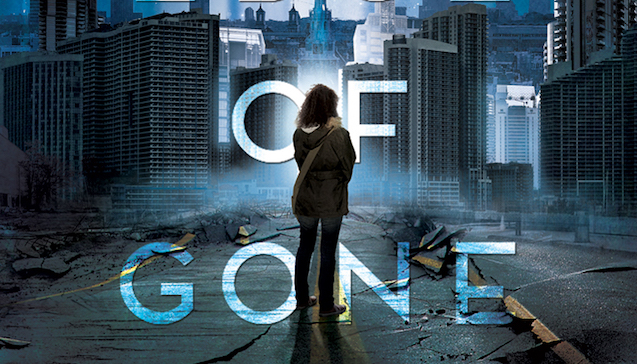5 Reasons to Read Corinne Duyvis’s On the Edge of Gone
 Hey, do you like mind-puzzling sci-fi with an organically diverse cast and on the edge of your seat tension? Yeah, me too. Let me turn your head towards On the Edge of Gone, a recent dystopian pleasure by Corinne Duyvis. In the year 2035, a comet is scheduled to hit earth, which will likely cause all kinds of natural disasters including, but not limited to, tsunamis, debris, darkness, and all kinds of other unknown variables. Some people are lucky or skilled enough to make it into a permanent shelter deep under the earth, or into a generation ship, built to carry the inhabitants and their offspring until they reach a habitable new planet.
Hey, do you like mind-puzzling sci-fi with an organically diverse cast and on the edge of your seat tension? Yeah, me too. Let me turn your head towards On the Edge of Gone, a recent dystopian pleasure by Corinne Duyvis. In the year 2035, a comet is scheduled to hit earth, which will likely cause all kinds of natural disasters including, but not limited to, tsunamis, debris, darkness, and all kinds of other unknown variables. Some people are lucky or skilled enough to make it into a permanent shelter deep under the earth, or into a generation ship, built to carry the inhabitants and their offspring until they reach a habitable new planet.
Denise, a mixed race girl with autism, and her family, are not among the lucky ones—they’ve only been assigned temporary shelter. Two days after the comet hits, they’ll be on their own in the scarred new earth. So when she and her mother stumble across a more stable shelter, they’ll do anything they can to get a spot on board.
With me so far? Here are five reasons you must read On the Edge of Gone.
[ean1]Awesome, own voices narration
Seeing the world of On the Edge of Gone through Denise’s eyes was like no other experience I’ve ever had with an autistic character on page or screen. Duyvis, an autistic woman herself, informs the character with her own experiences, but Denise always feels like a specific individual making choices unique to her. There are the recognizable markers used to signify autism (difficulty making eye contact, intense knowledge about a specific subject, dislike of being hugged), but Denise’s autism never feels like a grab bag of tropes. She’s her own person, with her own fears, joys, and personality quirks.
An equally awesome diverse cast of characters
As well as Duyvis does with the “own voices” aspects of the character, she does a beautiful job detailing voices that do not share her lived experience. Race, for instance, is always on Denise’s mind in a way it might not be for a white character who takes their social acceptance for granted. Duyvis also notes how Denise’s race may have complicated her diagnosis when she was younger. Along with the book’s racial diversity, its story is populated with characters of all different religions, sexual and gender orientations, and socioeconomic backgrounds.
Sci-fi that will challenge your mind
A fair warning to adrenaline junkies: this book is not an action roller coaster. On the Edge of Gone is a perfectly descriptive title for this story, the entirety of which takes place on the precipice between the world as we know it and apocalypse. The tension in the book centers around one big question: if not everyone can survive, do we have the right to decide who does? It’s not a question that takes Hunger Games or Faction Wars, but it’s one that kept me eagerly turning to the next page.
Real Danger. Real Fear.
That being said, wow, some of the depictions of the world post-comet are devastating. There are real stakes here, and real danger for the characters without permanent shelter. The scenes in which Denise explores the new world are harrowing, even tragic. While the book isn’t stuffed with big action scenes, the quiet sadness of those moments paint a frightening picture of what will happen to her if she doesn’t find better shelter. “I will die,” she repeats many times throughout the book, and no one ever contradicts her.
Empathy
Denise can be a frustrating character. She’s so focused on keeping her family safe that she can lose sight of the bigger picture, the shared calamity humanity is going through. It can make her appear selfish, or disastrously short-sighted, but the enormous compassion the book has for all of its characters is one of its greatest pleasures. Duyvis doesn’t try to paint everyone with a soft paintbrush. She acknowledges the harm people can cause each other with their selfishness and neglect. What she challenges is the idea that these flaws make people any less worthy of our sympathy, or of a second chance to do better. You’ll have to see for yourself what conclusion she comes to!